At Onefarm, we’ve made groundnuts the heart of our mission

What Are Groundnuts, Really?
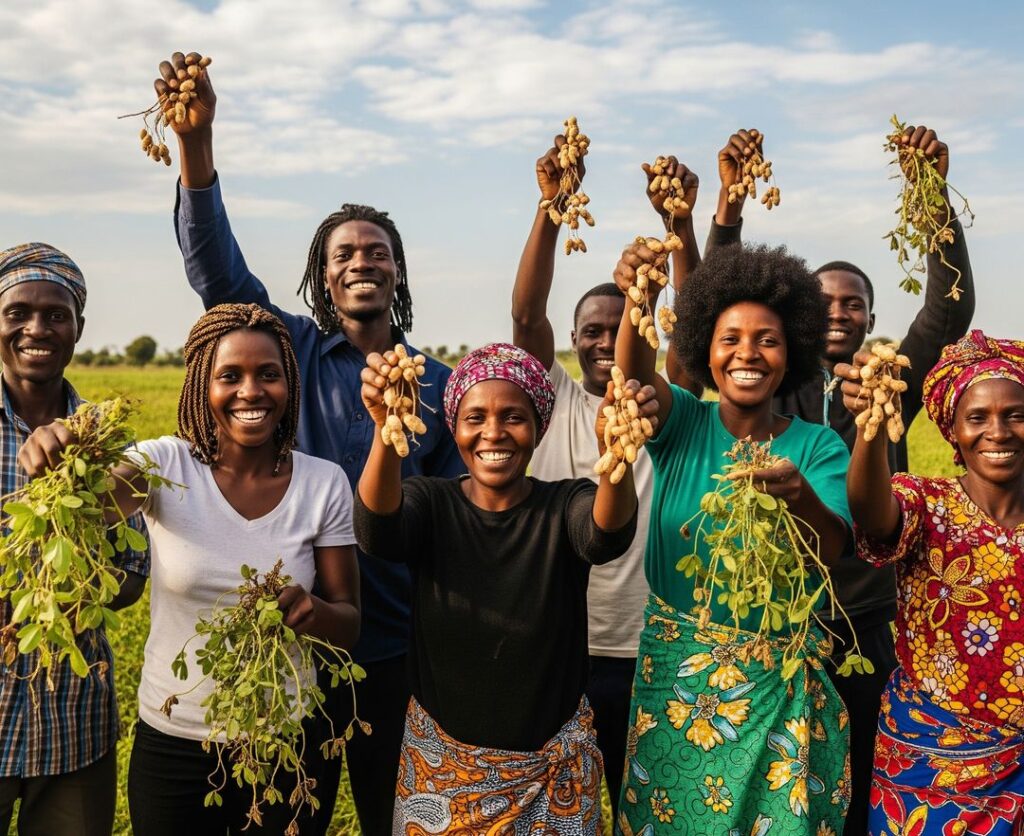
Groundnuts, though commonly called “nuts,” are technically legumes—belonging to the same family as beans, peas, and lentils. Unlike tree nuts, groundnuts develop underground in pods, maturing just below the soil surface. This underground growth gives them unique advantages: they absorb essential minerals directly through their shells and pegs, and as legumes, they form a symbiotic relationship with nitrogen-fixing bacteria, improving soil fertility naturally.
Groundnuts are well-suited to tropical savanna climates, thriving in sandy loam soils, moderate rainfall zones, and sunshine-rich regions. They are relatively low-maintenance compared to water-intensive crops like rice or maize, making them ideal for climate-stressed regions of Africa.
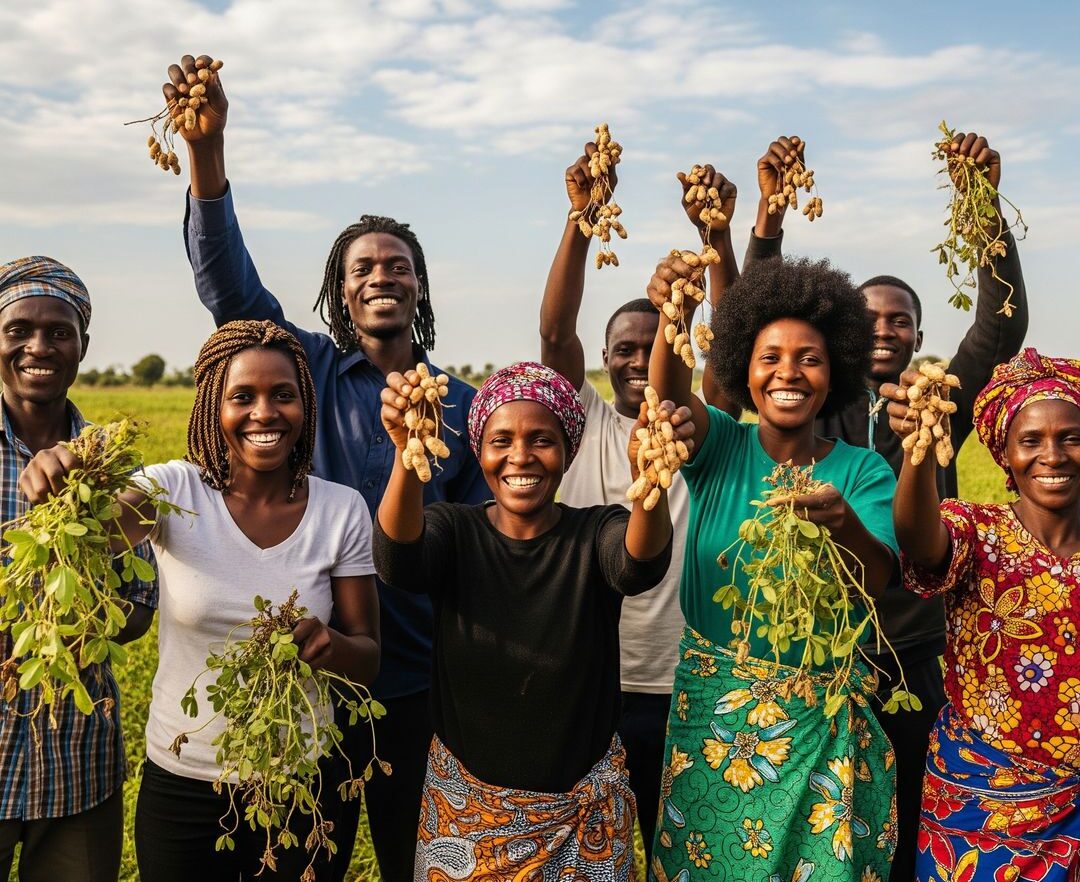
The Nutritional Powerhouse Africa Needs
Groundnuts are often called “nature’s multivitamin”—and for good reason. They are packed with critical nutrients that are essential for combating malnutrition, especially in rural and low-income communities.
Protein
Healthy Fats
Vitamins & Minerals
Energy Source

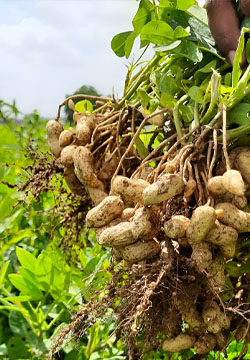
Protein
Healthy Fats
Vitamins & Minerals
Energy Source
In countries like Nigeria, where 37% of children under age 5 suffer from protein-energy malnutrition, the humble groundnut is a critical intervention crop—not just food, but medicine.
Why Groundnut? Why Now?
There are dozens of viable crops in Africa, so why has Onefarm chosen to bet on groundnuts?
Climate Compatibility
Groundnuts flourish in semi-arid regions and require less water than most staple crops. With increasing climate volatility across sub-Saharan Africa, drought tolerance is no longer optional—it’s a necessity.
Soil Restoration
As a nitrogen-fixing crop, groundnuts enrich the soil, making them essential to regenerative agriculture. They reduce the need for synthetic fertilizers, improve soil organic matter, and interrupt pest and disease cycles.
Economic Value
Nigeria alone produces 3.6 million metric tons of groundnuts annually, placing it third globally after China and India. Yet only a small fraction of this production is exported, and even less is certified organic. The global organic peanut market is valued at $4.2 billion—a goldmine waiting to be tapped.
Gender Equity
Across West Africa, 60–70% of groundnut farmers are women. By choosing this crop, Onefarm is directly impacting women’s livelihoods and empowerment through regenerative farming and fair trade practices.
The Onefarm Approach: Regenerative Organic Groundnuts
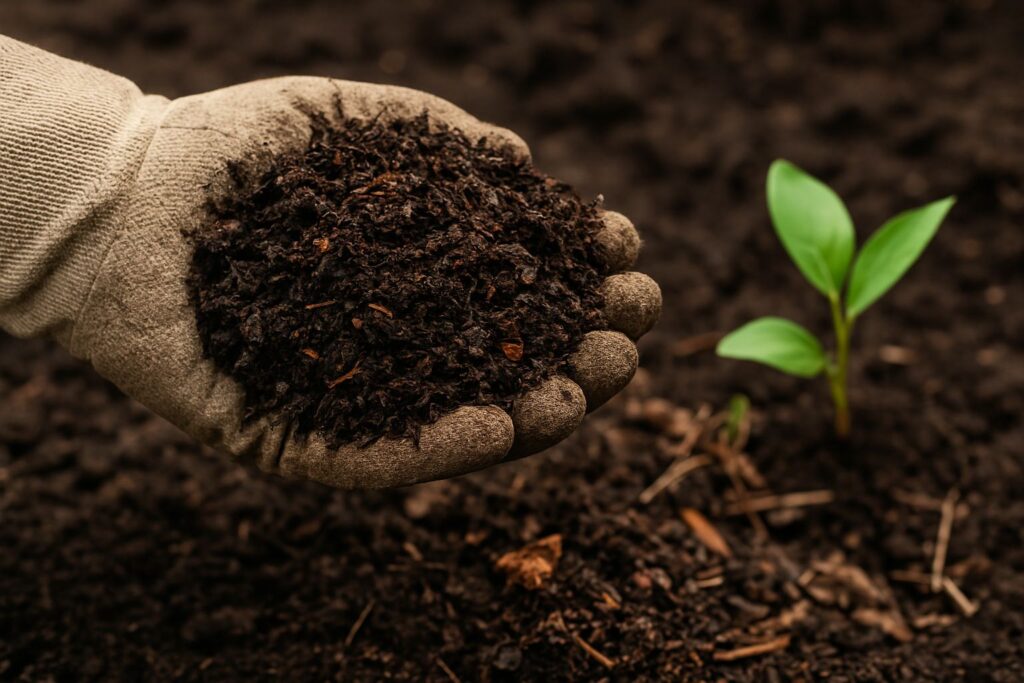
At Onefarm, we do not engage in conventional monoculture peanut farming. Instead, we implement a regenerative organic model that places environmental healing at the center of food production.
Closed-Loop Farming System
We have developed a sustainable farm ecosystem where nothing goes to waste:
- Peanut shells are used as biofuel in our processing plants.
- Vines are repurposed for animal feed.
- Manure + peanut residue becomes premium compost, sold for ₦₦₦/ton.
This circular agriculture model increases yields, reduces costs, and builds resilience against droughts and disease outbreaks.
Carbon Sequestration
Each hectare of groundnut farm managed under our regenerative system captures 2.5 tons of CO₂ per year. That’s a direct contribution to reversing climate change, one farm at a time.

Salmnut: The Star of Our Revolution
Onefarm’s flagship variety is Salmnut, a drought-resistant, high-yield groundnut strain developed specifically for West African conditions.
This variety allows us to tackle three problems at once: yield gaps, export barriers, and climate volatility.
From Soil to Shelf: Building a Groundnut Economy
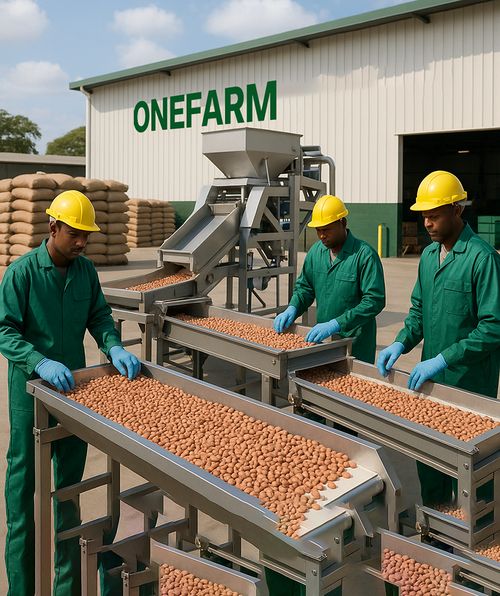
We’re not just growing peanuts—we’re creating an entire ecosystem:
Processing & Value-Addition
- Cold-Pressed Oil: 1 ton yields 450 liters of oil retailing at ₦2,500/liter.
- Peanut Flour: Gluten-free, protein-rich flour for bakeries and baby food industries.
- Snacks: Roasted, seasoned peanuts for Nigeria’s $3B snack market.
- Therapeutic Foods: High-protein groundnut paste for children with acute malnutrition.
Traceability & Tech Integration
We use drone surveillance to monitor plant health and identify issues before they escalate. Our blockchain-powered supply chain allows any buyer—from Lagos to Berlin—to trace a peanut back to the exact farmer who grew it.

Women First: Empowering a Hidden Workforce
At Onefarm, women aren’t just part of the system—they are central to it.
We’re proving that the future of farming in Africa is female-led, sustainable, and profitable.
Vision 2030: What’s Next for Groundnuts at Onefarm?
Our roadmap is bold—but rooted in reality:
We envision a future where groundnuts do more than feed people—they build economies, revive land, and unite communities.

Join the Groundnut Movement
From local communities to global markets, groundnuts are poised to reshape Africa’s agricultural story. At Onefarm, we are inviting you—investors, policy makers, researchers, and consumers—to join us in this once-in-a-generation opportunity.
As our CEO, Andrew Humber Osofisan, puts it:
“Groundnuts built Nigeria’s economy in the 1960s. At Onefarm, we’re ensuring they’ll rebuild it—sustainably—for the 21st century.”


